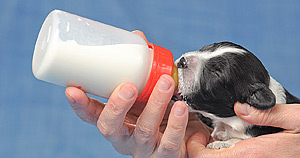Health of the Portuguese Water Dog

The Portuguese Water Dog is considered a very healthy breed. We advise you to keep the vaccines up to date and have your dog dewormed as regularly as possible. Their feed should consist in ration, and the occasional treat – they love biscuits and toast.
You can also give them bits of apple, carrot, banana, as long as in small doses. A very important rule – never give chocolate to your dog. Chocolate in excess can kill your animal. Be cautious!!
Your young puppy
Bringing a dog home is an important decision and should be well thought of. It’s a compromise that will last for years and as such, shouldn’t be taken on a whim. Also, several other factors should be taken in account – your lifestyle, space, your house, working schedules, family, budget, etc.
Selecting your pup
1. Know the puppy’s age, it should have at least 8 weeks, before it’s separated from the litter
2. Ask if there are any risks associated to the breed, like hip dysplasia
3. Make sure that the vaccines are up to date and the dog is dewormed
4. Ask about the food and which brand you should give them
5. Male or female? This question helps narrow the chances, if you’ve already made the decision.
It’s not easy taking a pick among so many in the litter – therefore let your heart choose. Otherwise, let the puppy choose you!
Initial Development
Probably you will only see your dog the first time when he is 8 weeks old. However, we do send pictures of the litter regularly, which means
you can see them grow. With our help and it’s mother’s help, the puppy will have already went through important steps in becoming
a balanced and socially apt dog.
Neo-natal Period (Birth – 2 weeks)
In the first days of life, dogs are completely dependant of their mother, for feeding and warming. We also help of course,
by holding them – this also accustoms them to human contact, so they are familiarized with people.
Transition Period (2-3 weeks)
The sensory and motor abilities develop rapidly as physical growth allows the puppy to see, smell, hear, taste and touch this new world for
the first time. After crawling and stumbling, by the end of this period, he will have learned how to walk. They start by coming out of the sleeping area so he can do his necessities, and this way, he will have a natural training for his physiological needs. On the end of this period, he will start
to grow teeth and he will have started to drink liquids other then his mother’s milk, chew on soft food and wiggling his tail!

